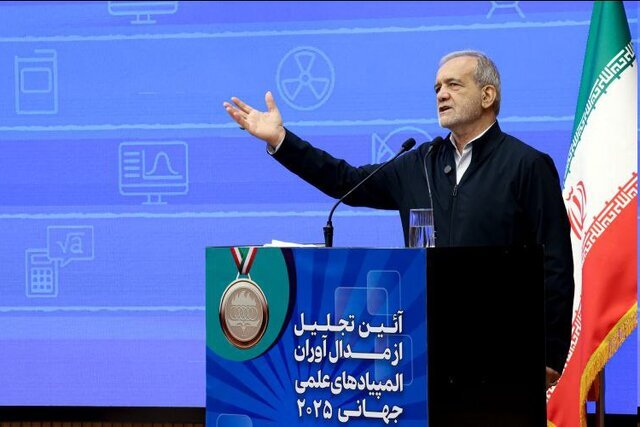TEHRAN – Iranian President Masoud Pezeshkian, speaking at a ceremony on Saturday, said Tehran would never surrender to coercion.
“They held a session last night to bring back the snapback — are they going to block our way? Minds and ideas either find a way or make a way,” he said.
“They may be able to strike Natanz and Fordow, but they forget that it is people who build Natanz and greater facilities — and they will do so again,” Pezeshkian added. “We will never bow to greed and aggression. We will not bend before any power.”
On Friday, a draft resolution aimed at permanently lifting pre-JCPOA UN sanctions against Iran failed to win the necessary support. Nine members opposed the measure, while Russia, China, Pakistan, and Algeria backed it, and two abstained. Unless a breakthrough occurs, the UN sanctions will automatically return by September 27.
In a statement published after the voting, Iran said the European signatories to the JCPOA (Germany, France and Britain) had rejected a reasonable Iranian offer that prevented the return of sanctions while also addressing European concerns on Tehran’s nuclear program. The E3 initiated the process to begin the “snapback” of anti-Iran UN embargoes in late August. Analysts believe London, Berlin, and Paris have proceeded with their plans to appease Washington, which left the 2015 nuclear pact three years after its signing and attacked Iranian nuclear sites back in June.
Elsewhere in his Saturday remarks, Pezeshkian stressed that Iran’s real wealth lies not in oil or gas but in its young, creative generation. “If we give talented people space and support, they can solve every problem. The enemy may destroy our achievements, but our scientists and specialists are the true national treasure,” he said.
The president said his administration’s top priority since taking office has been reforming the education system to identify and nurture talent. “We must raise children who, when faced with obstacles, immediately seek or make a way. No one can block the path of someone with determination and ability,” he said.
‘Cairo agreement would collapse if sanctions are reinstated’
The most immediate backwash of the potential restoration of UN sanctions is the collapse of Tehran’s recent cooperation agreement with the International Atomic Energy Agency (IAEA), concluded in Cairo earlier this month, according Deputy Foreign Minister Kazem Gharibabadi.
In a phone interview with IRIB News, Gharibabadi dismissed Europe’s move as “completely illegal,” saying Iran, China, and Russia had presented detailed legal arguments to the Council.
“If nothing special happens in the field of diplomacy and the UN sanctions are reinstated, it would be logical for the Cairo agreement to be completely stopped,” Gharibabadi warned. Still, he added that “the path of interaction and diplomacy is never closed.”
The Cairo deal, reached on Sept. 9 between Foreign Minister Abbas Araghchi and IAEA chief Rafael Grossi, outlined practical steps to resume cooperation. It followed a parliamentary vote obliging the government to suspend work with the agency after U.S.-Israeli strikes targeted three Iranian nuclear facilities, which Tehran and the majority of states in the world said violated international law and the Nuclear Non-Proliferation Treaty.
Gharibabadi cautioned against falling into “psychological operations” designed by Western governments, saying reinstated UN measures would not add much to existing U.S. sanctions, which already exceed those under the nuclear accord.
In separate remarks, the Foreign Ministry also declared that while Tehran would continue to pursue its rights through diplomacy, it reserved the right to deliver a “proportionate response” to any unlawful action.
NPT could be scrapped next
Iranian lawmakers have reacted to Friday’s voting too. Ebrahim Azizi, head of parliament’s National Security and Foreign Policy Committee, wrote on X that years of “maximum pressure” have failed, producing only higher costs for Iran’s adversaries. “Dialogue is a tool of power, but it is not an endless concession. Those who choose pressure will face a more decisive response,” he warned.
Ali Nikzad, the parliament’s deputy speaker, called the snapback attempt “a desperate bid to force Iran into submission to hegemonic powers.” Quoting a senior commander, he added: “There are opportunities within threats that do not exist within opportunities.”
The strongest response came from the spokesman of the Iranian Parliament’s National Security and Foreign Policy Committee. Ebrahim Rezayi stated in a post on X that it is now “time to leave the NPT and reconsider some doctrines.” This suggestion, however, is not entirely new. Multiple Iranian officials from across the political spectrum have warned since the lead-up to 2025 that a withdrawal from the NPT could very possibly follow a restoration of UN sanctions. The U.S.-Israeli attacks that occurred months later have further hardened Iranians’ stance, with many now believing that diplomacy is fruitless when dealing with the West.

